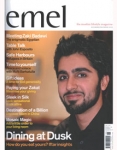
My Favourite Qur’an Translation
Issue 2 Nov / Dec 2003
Since the earliest times Muslim scholars have always emphasised that translations of the Qur’an can never be regarded as a substitute for the original; every Muslim should endeavour to study Arabic in order to understand the original meaning of the Qur’an. However, due to the fact that the number of non-Arab Muslims rapidly increased as the word of Islam spread across the globe, it became essential to translate the Qur’an. emel discovers the delights of reading Qur’anic translations and the way they can profoundly affect an individual’s personal experience of Islam.
The first English translations of the Qur’an were not actually translated from the original Arabic. In 1649, Alexander Ross translated a French translation of the Qur’an into English. Almost a century later, in 1734 George Sale, an English lawyer translated Luigi Marracci’s Latin rendition into English (Sir E. Denison Ross convincingly argues the case against Sale having translated the Qur’an directly from the original Arabic). Having been based on translations meant that these versions were of poor quality, containing many mistakes. In addition to this, these renditions were marred by the translators’ bias against Islam, for unfortunately, one of the enduring legacies of the Crusades was that ‘Muhammadanism’ continued to be regarded as a threat to the West.
Two other non-Muslim translators of the Qur’an were Arthur J Arberry (published in London, 1955) and J. M. Rodwell (published in London,1861). It was Arberry’s deep appreciation and admiration for the Qur’an as a literary masterpiece that led him to produce a translation as close to the original as possible in terms of the lyrical style and rhythmic composition. In contrast to Arberry’s reverent approach, Rodwell’s rendition is overtly hostile to Islam. In his translation Rodwell arranged the surahs or chapters into what he believed was the proper chronological order and also made an attempt to cross-reference the Qur’an with Christian and Jewish scriptures. Unfortunately, even the most recent translations of the Qur’an by non-Muslim scholars (with the exception of Arberry) contain distortions which clearly show their bias against Islam.
N. J Dawood, the Iraqi scholar of Arabic (the only Jew to have translated the Qur’an into English) has been criticised by Muslims for his inaccurate translation of the Qur’an (published in London, 1956). Unfortunately, it is his version that is often quoted by Christians in their attempts to discredit Islam.
Verily, We have made it a Qur'an in Arabic that you may be able to understand. The Qur'an, 43:3
Hafsah Abdullah is a university student from Manchester.
“I was so often reminded of the Day of Resurrection in The Qura'n, but never, until I read the English convert Marmaduke Pickthall’s translation, had I read a surah with such a powerful, almost violent rhythm running through it. Arafat K El-Ashi’s revised and edited version of Pickthall’s translation has particularly rendered it to be more reader-friendly and accessible to a younger audience. The verses of At-Takweer sketched scenes I could never have imagined. Scenes of striking, colourful images of both the present beautiful state of the universe and its condition on the last day. This fine imagery, which left me almost shaken, pulled me away from the safety and security I thought this world offered. As well as giving me an incredible insight of the Last Day, I was left with the realisation that the safety and protection I seek lies with Allah alone. For me, it was a reminder that the importance I attach to the values and riches of this world are of no significance. It helped me to establish a firm bond with the everlasting Truth. That on that Day, whilst everything changes or disappears, Allah will not.”
Imran Gauzi is a teacher from Bristol.
“I can remember clearly the first time I read Arthur J Arberry’s translation published in 1955. Although written by a non-Muslim it greatly enriched my understanding of my personal faith and left me with a deeper appreciation of Islam. I have read some of the most recent translations of the Qur’an by Al-Hilali and Dr Muhsin Khan, published in 1985, and Abdalhaqq and Aisha Bewely’s which was published in 1999. Abdalhaqq and Aisha Bewley are prolific scholars and in my opinion they have produced the most fluent and faithful translation available. I like the fact that they have retained some Arabic words although I can understand if this makes it slightly tedious for the non-Arabic reader who must constantly refer to the glossary provided at the back of the translation.”
Ruqaiyya Waris Maqsood is a teacher,
researcher and writer from Hull. “I like the translation produced in 1980 by the Austrian convert Muhammad Asad because it is the best one I know for giving the feel of the beauty and poetry and grandeur of the Qur'an. The way Asad expresses the sense of the verses is excellent. Also, I appreciate the quality and depth of footnotes. Asad, to me, is a scholar who has really understood the true 'feel' of Islam, although I have heard that he has been accused by some of deviating from orthodox Muslim opinion. I regularly put up several versions of the Qur'an for comparison, and invariably I find his the most useful in getting across the real meanings. His work is truly beautiful.”
Sakib Shaikh is an IT Project Manager from Manchester.
“I have used Marmaduke Pickthal which I find perhaps too classical and old fashioned. Dr Muhsin Khan’s translation, published in 1985 is widely used. However, I find it to be too dumbed down and spoilt by the overuse of parenthesis. This disrupts the flow when reading. Yusuf Ali composed one of the earliest translations and I find here the use of words from the classical English language to be powerful - it portrays the intensity of the words and their meanings. It instills an aura of the greatness of these words. Having read modern translations which dilute the meanings with the use of contemporary language, I find that I often return to Yusuf Ali's translation for that extra something - the ability of language to uplift and mesmerise the soul and mind.”
Bookmark this |
|
Add to DIGG |
|
Add to del.icio.us |
|
Stumble this |
|
Share on Facebook |
|
Share this |
|
Send to a Friend |
|
Link to this |
|
Printer Friendly |
|
Print in plain text |
|


Comments
0 Comments